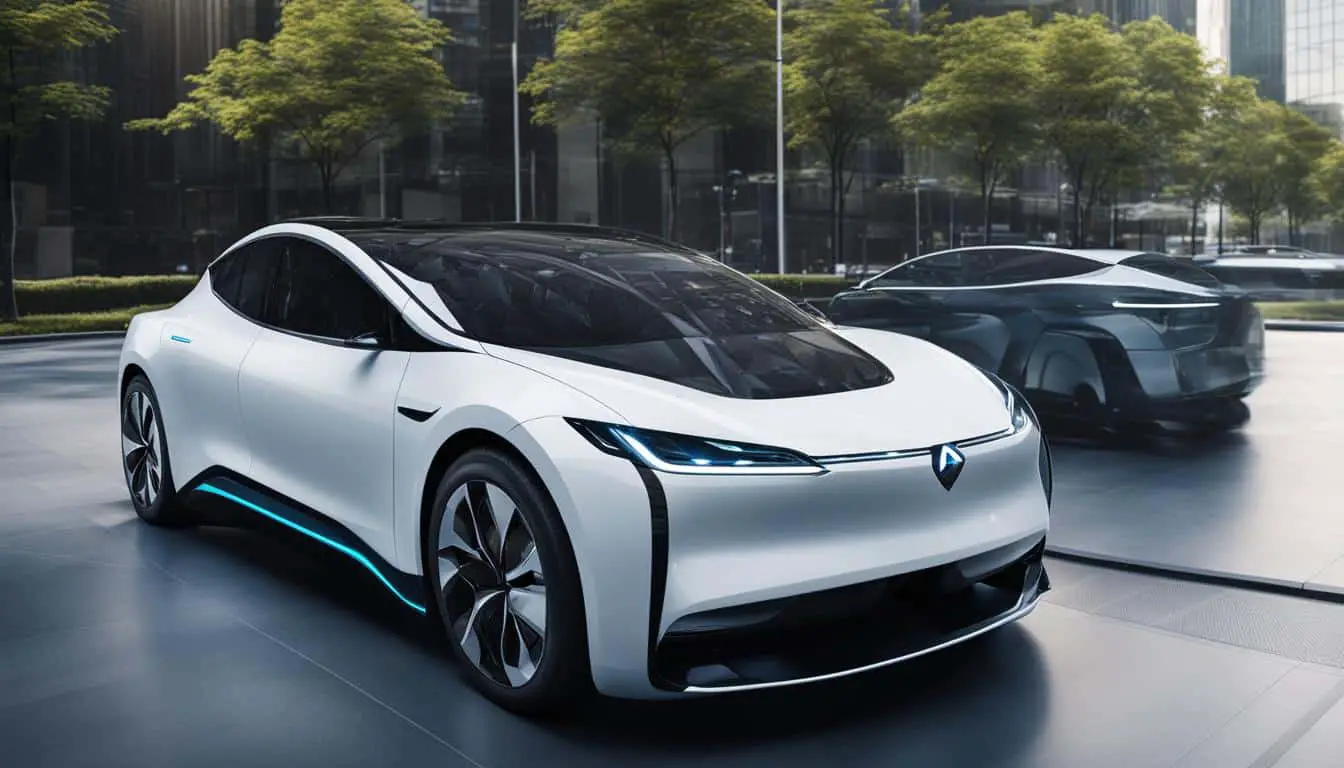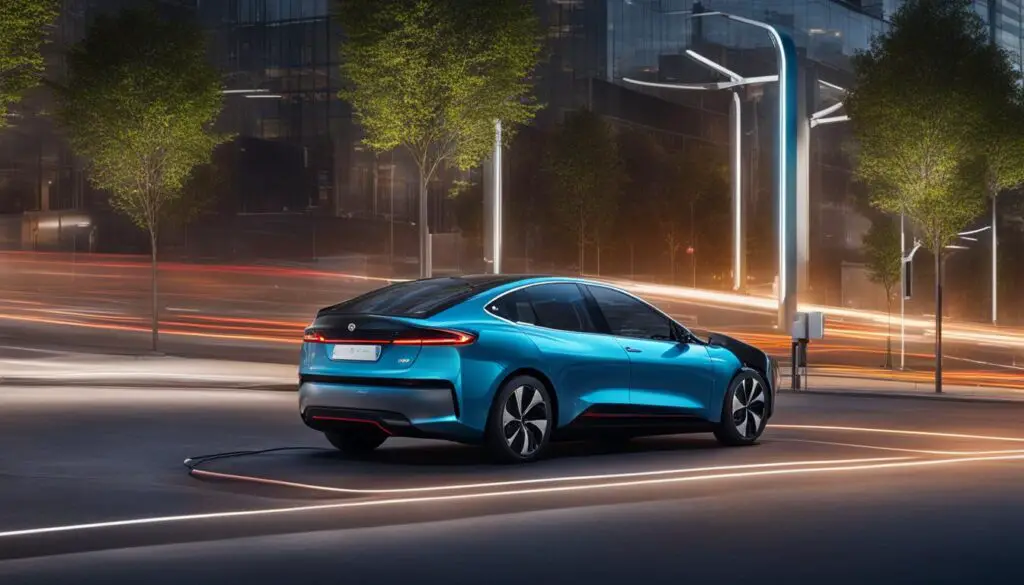
The Role of IoT in Enhancing Electric Vehicle Capabilities
The current state of the electric vehicle (EV) industry reflects a growing recognition of the need to reduce carbon emissions and increase the adoption of EVs. As advancements in electric vehicle technology continue to evolve, one technology stands out for its potential to enhance the capabilities of EVs: the Internet of Things (IoT).
IoT technology plays a crucial role in addressing challenges faced by EVs, such as range limitations and charging infrastructure. By enabling vehicle connectivity, predictive maintenance, energy management, fleet management, personalized user experiences, EV charging management, and battery management, IoT enhances the overall user experience, increases efficiency, reduces downtime, and offers potential cost savings.
Looking ahead, the future of IoT in the EV industry involves the expansion of IoT applications, further technological advancements, integration of artificial intelligence (AI) and machine learning (ML), and the emergence of new business models. With IoT accelerating the evolution of electric vehicles, a new era of sustainable transportation is on the horizon.
Key Takeaways:
- IoT technology enhances the capabilities of electric vehicles, addressing range limitations and charging infrastructure.
- IoT enables vehicle connectivity, predictive maintenance, energy management, fleet management, personalized user experiences, EV charging management, and battery management.
- IoT enhances the user experience, increases efficiency, reduces downtime, and offers potential cost savings in the EV industry.
- The future of IoT in the EV industry involves the expansion of IoT applications, technological advancements, integration of AI and ML, and the emergence of new business models.
- With IoT technology, electric vehicles are poised to transform the transportation landscape and contribute to a more sustainable future.
The Current State of the EV Industry
The current state of the EV industry highlights the increasing recognition of the importance of reducing carbon emissions and embracing electric vehicles (EVs). As the demand for more sustainable and eco-friendly transportation options grows, so does the adoption of EVs. One of the key drivers behind the advancements in EV technology is the integration of Internet of Things (IoT) solutions, particularly in battery management.
IoT technology has revolutionized the way EVs operate, leading to significant improvements in battery capabilities. The use of IoT in battery management has resulted in higher energy density, allowing for longer driving ranges and reduced costs in EV battery systems. This has addressed one of the major concerns associated with EV adoption – limited driving range. With IoT-enabled battery management, EVs can now cover more kilometers on a single charge, making them a practical and reliable choice for consumers.
Moreover, EVs offer a range of benefits beyond their environmental friendliness. By embracing EVs, we can significantly reduce air pollution, leading to cleaner and healthier cities. Additionally, EVs boast better energy-to-motion conversion efficiency compared to traditional internal combustion engine vehicles, resulting in more efficient energy usage and reduced operating costs over time.
However, despite the progress made in the EV industry, there are still obstacles to overcome. Initial investment costs for EVs remain relatively high compared to conventional vehicles. While the long-term savings in fuel and maintenance costs offset these initial expenses, upfront affordability remains a barrier for some consumers. Furthermore, although technological advancements have extended the driving range of EVs, the need for charging infrastructure and the possibility of range limitations continue to be areas of concern.
Overall, the current state of the EV industry reflects the positive momentum toward sustainable transportation solutions. The integration of IoT technology, particularly in battery management, has enabled significant improvements in EV capabilities. As we continue to address the challenges associated with EV adoption, it is crucial to further develop and invest in IoT solutions to unlock the full potential of the EV industry.
Key Points:
- The EV industry is experiencing growth due to the need for reduced carbon emissions and the increasing adoption of EVs.
- IoT technology has played a significant role in improving EV capabilities, especially in battery management.
- IoT-enabled battery management has led to higher energy density, longer driving ranges, and reduced costs in EV battery systems.
- EVs offer benefits such as air pollution reduction, better energy-to-motion conversion efficiency, and lower operational costs.
- Challenges such as initial investment costs and driving range limitations still exist in the EV industry.
Top IoT Applications in Electric Vehicles
IoT technology has revolutionized the electric vehicle (EV) industry, enabling various applications that enhance vehicle capabilities and pave the way for a sustainable and efficient future. Through IoT, EVs can benefit from vehicle connectivity, predictive maintenance, and energy management, among other applications.
1. Vehicle Connectivity
One of the key IoT applications in EVs is vehicle connectivity, which allows for real-time data collection and monitoring of vehicle performance parameters. By leveraging sensors and connected systems, EVs can transmit valuable insights about battery health, charging status, and overall vehicle efficiency. This connectivity enables users to stay informed about their vehicle’s condition and make data-driven decisions for optimized performance.
2. Predictive Maintenance
Predictive maintenance is another vital IoT application in EVs. By continuously monitoring various vehicle components and analyzing data, IoT systems can identify potential issues before they escalate and cause costly breakdowns. This proactive approach to maintenance helps ensure the longevity and reliability of EVs, reducing downtime and improving overall vehicle availability.
3. Energy Management
Efficient energy management is crucial for EVs to maximize their range and performance. IoT applications enable intelligent energy management by optimizing the usage of power-hungry components, such as the battery, motor, and HVAC system. Real-time data analysis allows for dynamic adjustments in energy allocation, extending the vehicle’s range and improving overall efficiency.
These IoT applications in EVs not only enhance user experience and increase efficiency but also contribute to significant cost savings. With improved vehicle connectivity, predictive maintenance capabilities, and optimized energy management, EV owners can enjoy a seamless and reliable driving experience while reducing operational expenses.

As the EV industry continues to advance, the integration of IoT technology will play a vital role in shaping its future. With ongoing innovations and technological advancements, we can expect even more sophisticated IoT applications, integration of AI and ML, and the emergence of new business models. The potential for IoT to revolutionize the EV industry is immense, unlocking unprecedented levels of efficiency, sustainability, and convenience.
Benefits of IoT in the EV Industry
The integration of IoT technology brings significant benefits to the electric vehicle (EV) industry, enhancing user experience, increasing efficiency, and providing cost savings. By incorporating IoT into EVs, manufacturers and users can take advantage of innovative features and advanced capabilities to optimize their EVs’ performance and enjoy a more seamless driving experience.
Enhanced User Experience
IoT technology enables personalized in-car experiences, allowing users to customize climate settings, entertainment options, and more. With IoT connectivity, EVs can seamlessly integrate with smart home systems, enabling features like pre-conditioning the vehicle’s temperature before a journey or integrating with voice assistants to provide hands-free control.
“The integration of IoT in EVs enhances the user experience by providing personalized in-car experiences, such as customized climate settings and entertainment options.”
Increased Efficiency
One of the key advantages of IoT in EVs is the optimization of energy usage and charging processes. IoT-enabled systems monitor and analyze energy consumption in real-time, allowing EVs to adapt and adjust power distribution accordingly. This optimization leads to reduced charging times and increased overall range, maximizing the efficiency and convenience of EVs.
Cost Savings
The implementation of IoT technology in the EV industry offers cost savings opportunities. By enabling predictive maintenance, IoT systems can identify potential issues in the vehicle’s components before they become significant problems. This proactive approach reduces downtime, prevents costly repairs, and ensures optimal performance. Additionally, IoT technology optimizes energy consumption, reducing operational costs and providing long-term cost savings for EV owners.
Overall, the integration of IoT technology in the EV industry delivers significant benefits that enhance the user experience, increase efficiency, and generate cost savings. From personalized in-car experiences to optimized energy usage and reduced maintenance costs, IoT empowers the EV industry to continue its rapid growth and drive towards a sustainable future.
| Benefits of IoT in the EV Industry |
|---|
| Enhanced User Experience |
| Increased Efficiency |
| Cost Savings |
The Future of IoT in the EV Industry
The future of IoT in the electric vehicle (EV) industry holds immense potential for growth and innovation. As technology continues to advance, we can expect to see an expansion of IoT applications within EVs, pushing the boundaries of optimization and customization.
Technological advancements will drive the evolution of IoT capabilities in EVs. With improved energy management systems, EVs will become even more efficient, offering extended driving ranges and faster charging times. Predictive maintenance will also become more sophisticated, allowing for proactive identification and resolution of potential issues before they impact performance.
Integration of artificial intelligence (AI) and machine learning (ML) will further elevate the capabilities of EVs. AI algorithms will enable intelligent decision-making, optimizing various aspects of EV operation such as energy usage, route planning, and even personalized user experiences. ML algorithms will continuously learn from EV data, refining performance, and making pre-determined adjustments for optimal efficiency.
These advancements will not only enhance the functionality of EVs but also shape the future of the EV industry as a whole. As IoT continues to be at the forefront, new business models will emerge, creating opportunities for innovative startups and established players alike to reimagine the way we use and interact with EVs.
FAQ
What is the role of IoT in enhancing electric vehicle capabilities?
IoT technology plays a crucial role in enhancing the capabilities of electric vehicles (EVs). It enables vehicle connectivity, predictive maintenance, energy management, fleet management, personalized user experiences, EV charging management, and battery management, which enhance the user experience, increase efficiency, reduce downtime, and offer potential cost savings.
What is the current state of the EV industry?
The current state of the EV industry reflects a growing recognition of the need to reduce carbon emissions and increase the adoption of electric vehicles (EVs). IoT technology has played a significant role in improving EV capabilities, particularly in battery management. However, challenges such as initial investment costs and driving range limitations still exist.
What are the top IoT applications in electric vehicles?
The top IoT applications in electric vehicles include vehicle connectivity, predictive maintenance, and energy management. Vehicle connectivity allows for real-time data collection and monitoring of vehicle performance parameters, while predictive maintenance enables addressing potential issues before they become significant problems. Energy management applications optimize energy usage in various vehicle components, extending the vehicle’s range and improving efficiency.
What are the benefits of IoT in the EV industry?
IoT enhances the user experience by providing personalized in-car experiences, increasing efficiency by optimizing energy usage and charging processes, reducing downtime by enabling predictive maintenance, and offering cost savings in operational costs and long-term maintenance.
What is the future of IoT in the EV industry?
The future of IoT in the EV industry involves the expansion of IoT applications, technological advancements, the integration of AI and ML, and the emergence of new business models. This includes further optimization and customization, enhanced energy management capabilities, improved predictive maintenance, and intelligent decision-making and automation.
